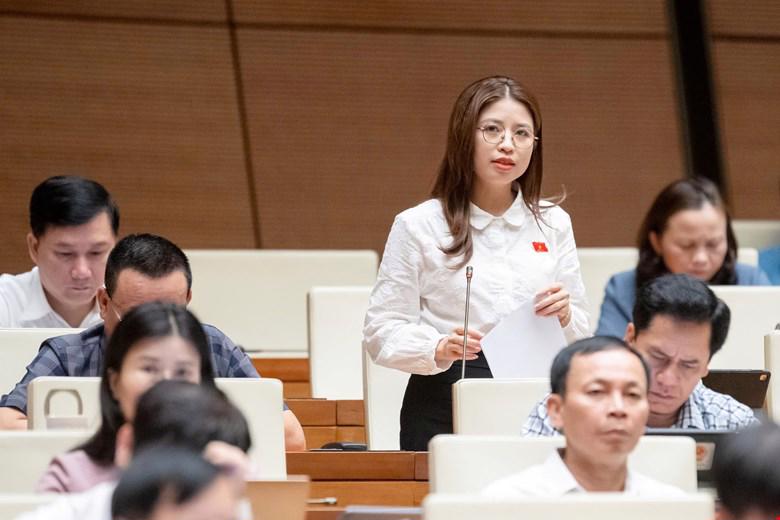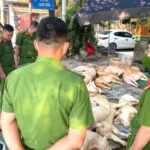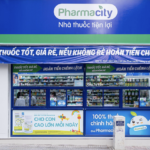Discussions in the assembly hall on the Law on Amending and Supplementing a Number of Articles of the Law on Product and Goods Quality, delegate Tran Thi Khanh Thu of Thai Binh province, emphasized that product quality management is one of the important factors in protecting consumers, enhancing the competitiveness of enterprises and the nation.
Especially, in the past, a series of functional food counterfeiting cases were discovered by the authorities, which further rang alarm bells regarding the dangers related to the quality and origin of goods and products that we use daily and everywhere in the market.
TAKING ADVANTAGE OF THE MECHANISM TO FORMALIZE FLOATING GOODS
Clause 6, Article 6 on the state’s policy in managing the quality of products and goods encourages and supports enterprises to apply the traceability system.
Discussing this issue, according to the delegate, some products must regulate the mandatory application of traceability measures instead of just encouragement. For example, special products such as food must ensure transparent traceability to control quality.
For milk products, functional foods, and health foods, although there are quite a few management regulations, there are still cases of businesses producing fake drugs and milk, sometimes lasting for many years before being discovered, causing public outrage and concern.

Citing this fact, Delegate Thu argued that “the current regulation allows enterprises to self-declare, and some dietary supplements and ordinary foods do not need to wait for approval before circulation, nor do they need confirmation from specialized management agencies before being put on the market.”
This is a policy to facilitate and reduce administrative procedures for enterprises, but this form also exposes many loopholes and risks to community health and state management. Management agencies do not actually test the products but only control them through the enterprises’ submitted documents. While enterprises have full autonomy over the information they declare, there is also a risk of untruthfulness and dishonesty.
Not to mention, if a food product is found to be unsafe, it is difficult to trace its origin and hold the enterprise accountable due to self-created documents and a lack of third-party confirmation. Some businesses take advantage of this mechanism to legalize substandard, counterfeit, and floating goods. They prioritize profits over safety standards, increasing the risk of health hazards, food poisoning outbreaks, and epidemics.
The reality of incidents related to the safety of nutritional products in the past is a regrettable consequence of this shortcoming.
According to the delegate, the self-declaration policy aims to reduce administrative procedures and facilitate enterprises towards advanced management practices, and many countries worldwide have adopted this approach.
Therefore, Vietnam should still maintain the self-declaration mechanism for ordinary products to facilitate and reduce procedures but needs to enhance the responsibility of implementation, tighten post-checks, apply transparent technology, and require self-declared products to be mandatorily publicized online and have their dossiers transparently available on the National Portal, easily traceable to their source.
Test results must be publicly available, applying management and traceability technology, and especially prohibiting excessive advertising of efficacy. Any statements such as curing diseases or rapid weight loss must be strictly managed.
In addition, according to the delegate, it is necessary to stipulate in the law that in case of violations related to product quality and safety, strong penalties must be imposed. If any enterprise is found to be fraudulent, heavy fines should be imposed, their business licenses suspended, or even production halted, and criminal liability pursued in case of serious consequences.
SUPPLEMENT THE PRINCIPLE OF POST-CHECKS CORRESPONDING TO EACH GROUP OF PRODUCTS AND GOODS ACCORDING TO THE RISK LEVEL
Commenting on the principle of classification and management of product and goods quality, delegate Nguyen Thi Ha of Bac Ninh province stated that the draft has divided goods into three groups: low-risk, corresponding to Group 1 in the current law, medium-risk, and high-risk, corresponding to Group 2 in the current law.
This is one of the progressive points of the draft law, but the management principle in this clause still leans towards pre-control measures. It requires products to have self-assessment results, test results from the producer or trader, or assessment results from a designated third party, without a quality management system principle to ensure that the products manufactured meet technical standards and have stable quality.
Testing the final product is not an effective measure for managing the quality of products and goods, as many delegates have opined and analyzed.

The delegate cited the lesson from the recent case of nearly 600 counterfeit milk products. Although samples were tested and evaluated as conforming to standards and technical regulations before circulation, the producer did not manufacture them according to the initial samples. Meanwhile, the state management agency did not conduct thorough post-checks, and consumers assumed that the products had been properly declared for technical standards.
According to international practice, the classification of products by risk level serves to apply corresponding risk management measures, and this regulation is unclear about the frequency or extent to which organizations or individuals must self-assess.
Therefore, the delegate proposed that the drafting agency amend the regulation to supplement the principle of applying a quality management system and the principle of post-checks corresponding to each group of products and goods according to the risk level or authorize the Government to stipulate, clearly defining the coordination between ministries and sectors in managing groups of goods, especially medium- and high-risk goods. She also suggested reviewing and amending immediately some relevant specialized laws.
Regarding the classification of goods according to risk level (low, medium, and high), Delegate Nguyen Duy Thanh of Ca Mau province opined that this is a basis for producers to choose appropriate measures to control the quality and safety of their products, and for the state to determine the inspection frequency corresponding to the “post-check” stage, which is necessary.
However, the delegate believed that the draft focuses too much on “pre-checks” through conformity declaration measures for each group of products, an issue that is still controversial and considered inappropriate, neglecting “post-check” measures. “Post-checks are an important measure for the state to ensure that only products with quality and safety are allowed to circulate,” said the delegate from Ca Mau.
Emphasizing the shift in thinking from pre-checks to post-checks, however, according to Delegate Pham Van Hoa of Dong Thap province, in reality, there is a situation where “pre-checks cannot control, and post-checks are neglected,” leading to consumers mistakenly using low-quality goods while believing they are using quality products.
INCREASING PENALTIES FOR VIOLATIONS, INCLUDING CRIMINAL SANCTIONS AND REVOCATION OF BUSINESS LICENSES
Explaining some issues raised by the delegates, Minister of Science and Technology Nguyen Manh Hung stated that the draft law has shifted from administratively dividing products into groups (Group 1 and Group 2 as before) to classifying products and goods according to risk levels to manage them differently, moving towards less pre-control and more supervision and post-control. The order has also changed from pre-control, post-control, and supervision to supervision, post-control, and pre-control.
For high-risk products, conformity declaration with the assessment of a third party is required, and most countries do the same with about 5-10% of total goods. For the remaining 90-95%, post-control is applied. Enterprises can self-declare conformity and take responsibility for medium-risk products. As for low-risk products, enterprises declare the applicable standards, technical regulations, and product features if any.

According to the Minister, whether it is pre-control or post-control, post-control is still the fundamental and long-term measure. The frequency of post-control depends on the product’s risk level and the enterprise’s reputation. Reputable enterprises with few violations will have a lower post-control frequency. Conformity assessment by a third party for conformity declaration purposes is done once and can be used for multiple administrative procedures if necessary, without overlapping procedures between registration, circulation, and conformity certification in different laws.
For imported goods, international assessment results will be recognized instead of physically affixing conformity declaration labels on the products themselves, as was previously the case. For imported goods with a medium risk level that have the same type, name, label, production facility, and packaging material, the draft law provides for reduced procedures for conformity assessment and self-declaration of conformity for subsequent imports.
According to the Minister, these are strategic changes, shifting from mainly pre-control to supervision, post-control, and risk management, reducing compliance costs for enterprises while still protecting consumers and conforming to international practices. In other words, a balance must be struck between the state, enterprises, and consumers. “We should facilitate enterprises while better protecting consumers and ensuring orderly development, with an increased role for social organizations in post-control, as mentioned by the delegates.”
The Minister also emphasized increasing penalties for violations as a deterrent. Previously, only administrative fines were imposed, but now criminal penalties, business license revocation, and public disclosure of enterprise violations on the national digital platform have been added. For activities of self-declaration of conformity or self-declaration of applicable standards, if fraud is discovered, higher penalties will be applied, possibly including the revocation of the right to self-declare. In other words, post-control must be accompanied by higher responsibility from enterprises.
The Shocking Truth: Nearly 800 kg of Rotten Pork Seized Before Reaching Consumers
The authorities in Vinh Phuc province inspected a restaurant and uncovered a disturbing find: nearly 800 kg of foul-smelling pork, unfit for human consumption.
Obscure Origins of Animal By-Products
The variety of offal, including items such as pig intestines, stomachs, tripe, and lungs, which are prohibited from being imported, are still readily available in the local market.
Internal Organs and Eggs: A Dark Online Trade.
“A plethora of social media groups and online communities are dedicated to selling frozen meat and seafood at incredibly affordable prices. Every day, these groups are bustling with activity as they advertise mouth-watering deals on a diverse range of products, including pork, beef, chicken, seafood, and fish balls, to name a few. With their continuous promotions and attractive offers, they have captured the attention of many savvy shoppers seeking convenient and budget-friendly food options.”








![[Photo Essay]: Experts, Managers, and Businesses Unite to Forge a Path Towards Sustainable Green Industry](https://xe.today/wp-content/uploads/2025/07/z678592918-218x150.jpg)











